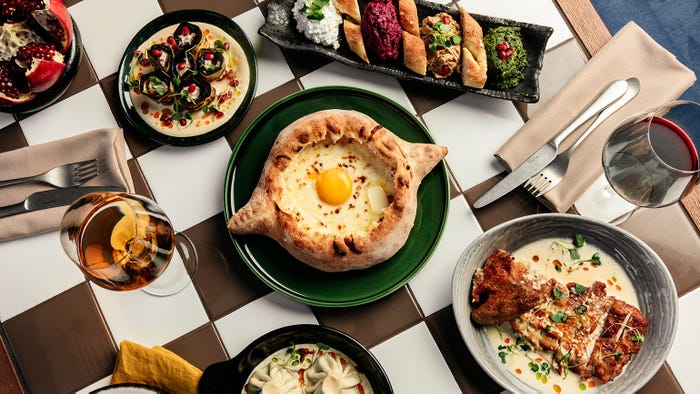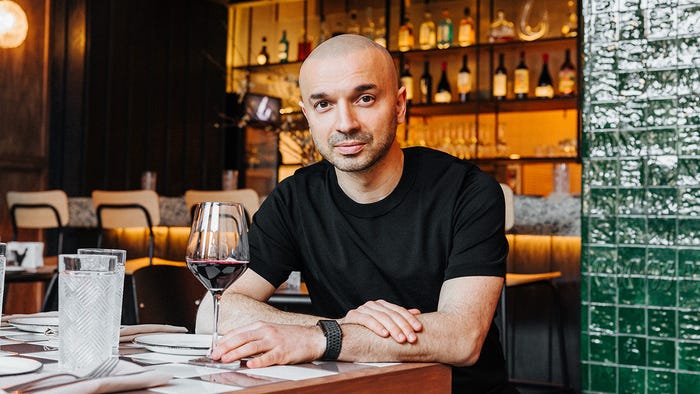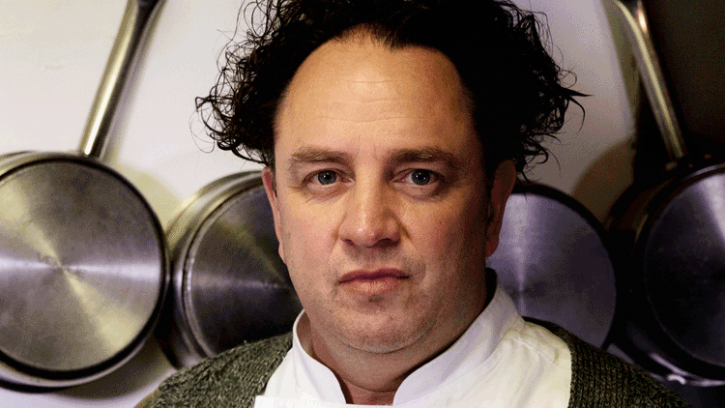Gurami Oniani is a prolific restaurateur. His Guliani Group has opened more than 30 restaurants highlighting the food of the former Soviet republic of Georgia. The concepts range from casual spots to fine-dining destinations across Georgia’s capital, Tbilisi, as well as Moscow. Last month, he opened his first stateside restaurant with the debut of Laliko in New York City’s West Village neighborhood.
“I came to New York City with a clear purpose: to help Georgian cuisine gain the recognition it truly deserves,” explained Oniani. “Georgia has a vibrant culinary heritage, full of bold flavors, ancient traditions, and soulful hospitality, but it’s still relatively unknown to much of the world.”
He believed that New York’s cultural diversity and openness to global flavors would be the best stage to introduce Georgian food to a new audience.
The 42-seat restaurant was designed by Surgula Studio and reflects Georgia’s heritage, with custom details like hand-painted Tbilisi tiles and artistic nods to the country’s winemaking and cultural history. There’s also a communal table inspired by the Georgian supra, a traditional feast and social gathering.
The menu features a variety of Georgian dishes that highlight regional flavors and traditional techniques. Appetizers include freshly baked bread that’s infused with garlic and rosemary and served with traditional spreads and sauces like tkemali (a tart plum sauce), ajika (a spicy chile paste), and walnut-based pkhali.

The menu features dishes like khachapuri and khinkali, along with Georgian wines. Photo credit: Jovani Demetrie
A couple staples include khachapuri — soft, cheese-filled bread — and khinkali, the iconic Georgian dumplings available stuffed with beef and pork, lamb, cheese, or mushrooms in truffle sauce. One fun dish is the “mother khinkali,” which is a giant dumpling filled with six smaller dumplings.
Additional items include chashushuli, a rich beef stew with tomatoes and bell peppers, and kupati, a grilled sausage served with celery root purée and pomegranate.
Laliko has three chefs handling day-to-day operations. Executive chef Manuchar Tsikolia oversees the kitchen and the menu, while two other chefs (Jimi Kurtanidze and Ruslan “Ucha” Giorgberidze) are respectively dedicated to the restaurant’s most popular dishes: khachapuri and khinkali.
Compared to just five years ago, Oniani said that there’s now more awareness of Georgian cuisine, especially in New York. But many of Laliko’s guests are still trying the food for the very first time. “And honestly, we love that. Some of our favorite moments come from watching people discover dishes they’ve never heard of before.”
He noted that khinkali in particular, a Georgian version of a soup dumpling, almost always requires a bit of guidance.
“It’s not just something you eat — it’s something you experience,” Oniani said. “That’s why we created illustrated step-by-step instructions to show guests exactly how to do it. Pick it up by the top, bite, blow to cool the broth, sip, and then enjoy the rest. It’s fun, interactive, and always gets people talking. Sharing these little rituals is part of bringing the culture to life.”

Gurami Oniani operates more than 30 restaurants in Tbilisi and Moscow. This is his first in the U.S. Photo credit: Jovani Demetrie
Currently, Oniani and his team are focused on ensuring that Laliko operates at a high level.
“The next four to five months are all about refining every aspect of the guest experience and internal operations,” he said. “We’re learning a lot from the day-to-day, and those insights will directly inform our next move.”
He eventually hopes to open more restaurants in the U.S.
“One of the main reasons we came to the U.S. is because of the incredible opportunity to scale,” he said. “We’ve built and grown restaurant chains before, so we understand what it takes, and we genuinely enjoy the process of turning a strong concept into something bigger.”
One thing Oniani already knows for sure is that the next concept will also be in Manhattan.
“We’re already exploring ideas and gathering inspiration, but we want our next step to be thoughtful and based on real experience, not just ambition.”
For more on Georgian cuisine, visit here.







